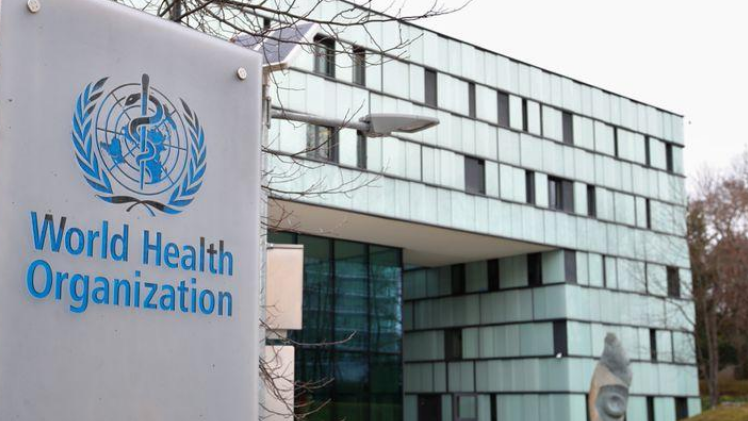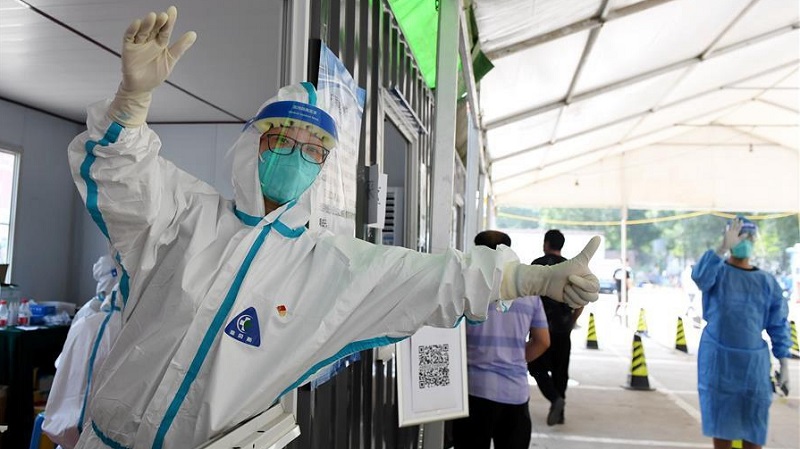
The Wuhan Institute of Virology. (Photo: VCG)
Editor's note: Huo Zhengxin is a law professor at the China University of Political Science and Law. The article reflects the author's opinions and not necessarily the views of CGTN.
The COVID-19 pandemic is the most challenging crisis the world has faced since World War II, and it "will forever alter the world order," as Henry Kissinger warned. After the pandemic was identified in Wuhan at the end of 2019, the Chinese government has taken immediate and decisive measures to contain the spread of the infection out of paramount concern for the life, safety and health of the Chinese people and the welfare of humanity.
China's anti-epidemic strategy has proved successful. Within a month of the Wuhan quarantine, the rising spread of the virus was contained. Within two months, the daily increase in domestic COVID-19 cases fell to single digits, and in approximately three months, a decisive victory was secured in the fight against the pandemic. China has become the first major country that has largely brought the COVID-19 pandemic under control, and China is the only major economy in the world to return to growth since the outbreak of the pandemic.
Equally importantly, China has been at the forefront of the global fight, believing that COVID-19 knows no borders and cannot be defeated without working together. According to the latest data, China has donated and exported more than 750 million doses of COVID-19 vaccines overseas, which has provided more vaccines than all other countries combined.
Moreover, China is the first country in the world to cooperate with the World Health Organization (WHO) to carry out a coronavirus origin-tracing investigation. In March this year, a joint WHO-China research group of a team of experts released the findings that looked into humans, animals and the environment in Wuhan. In the 123-page report, all the scientists involved unanimously agreed that there were neither grounds nor a shred of evidence to link the virus' origin to the Wuhan lab leak theory.

A COVID-19 patient arrives at the Maimonides Medical Center, New York, U.S., November 17, 2020. (Photo: CGTN)
The report concluded that the outbreak was likely caused by the virus jumping from bats to humans through an intermediary animal and labeled the lab leak hypothesis as "extremely unlikely." The report suggested it was important to investigate "potential early events" of COVID-19 cases reported in different countries. China's contribution to the global anti-pandemic campaign has won worldwide appreciation and respect.
In contrast, the U.S. has mishandled the crisis from the beginning to the present day. Since the first U.S. case of COVID-19 was confirmed on January 20 last year, the U.S. response has been defined by inadequate resources, failed leadership, confusing communication and blatant misinformation. The U.S.' mismanagement of the pandemic has serious consequences for the American people, as the country continues to lead the world in both COVID-19 cases and mortality since March 2020. COVID-19 has killed at least 617,273 people and infected about 35.8 million in the U.S. since last January, according to data from Johns Hopkins University on August 8, 2021.
Moreover, the "America First" vaccine strategy has weakened international cooperation in the fight against the pandemic. As with most of its policies, the former Donald Trump administration opted for an "America First" approach to public health, prioritizing domestic COVID-19 vaccination efforts over multilateral initiatives. Though one of Joe Biden's many promises when he assumed office was to put an end to the "America First" approach, the U.S.'s commitment to prioritizing its own vaccine procurement remains unchanged.
Unfortunately, the disastrous failure to respond to the COVID-19 challenge has not sparked any self-reflection in the U.S. government. From the Trump administration to the Biden administration, the White House has been trying to shift the blame from its own mishandling of the crisis onto China. The Trump White House repeatedly labeled the virus a "China virus" or "Wuhan virus," which fostered a perception that the virus was unleashed by China, despite the WHO's renaming of the virus to avoid further stigmatizing.
After Biden took office, he continued the policy of using China as a scapegoat to serve the purpose of describing the U.S. as the victim of external forces rather than its own mismanagement.
When these deflection efforts failed to end the public criticism of the administration, the Biden White House began to give fresh life to the lab leak theory, initially pushed by fringe groups, to stigmatize China. In May this year, Biden ordered U.S. intelligence officials to "redouble" their efforts to investigate the origins of the COVID-19 pandemic, including the unlikely possibility that the origins of the virus trace back to a Chinese lab in Wuhan, adding that he will continue to press for China to participate in a full investigation.

WHO headquarters in Geneva, Switzerland, February 6, 2020. (Photo: CGTN)
Under tremendous pressure from the U.S., WHO Director-General Tedros Adhanom Ghebreyesus stated in July 2021 that there had been a "premature push" to rule out the coronavirus lab leak theory. He proposed a second phase of the investigation into the origins of the pandemic to revisit the theory that COVID-19 had leaked from Wuhan's virology laboratory.
Departing from his repeated appreciation of China's speed, transparency and cooperation with the WHO, Tedros said this time that he was asking China to be transparent and cooperative – to the surprise of the international community.
China firmly rejected the second phase origin tracing plan proposed by the WHO director-general, as it discounted the outcomes of the first-phase investigation conducted by its own experts and ran counter to common sense and science.
First of all, the origin tracing plan targeting a particular country defies science. The reason is self-evident: viral and infectious diseases know no borders and distinguish no races; they may appear and break out in any country. The place where the pandemic first emerged does not necessarily mean that it is the origin of the pathogen.
For example, though the calamitous 1918 influenza pandemic was commonly known as "Spanish flu," the first known case was reported at a military base in Kansas, the U.S. In the 1980s, the AIDS pandemic first swept across the U.S., but it was later scientifically confirmed that the HIV virus originated decades earlier in Equatorial Africa.
In the case of COVID-19, though Wuhan is where the pandemic first emerged, the latest evidence suggests that the virus occurred in the U.S. and Europe earlier than previously thought and before even the first cases in the city had been publicly identified. Therefore, the report of the first-phase investigation considered the possibility of missed circulation in other countries and suggested the need to "investigate these potential early events."
Second, targeting China in the name of an origin tracing study undermines the impartiality and integrity of the WHO and hinders global anti-pandemic cooperation. As noted above, being the first country to cooperate with the WHO to examine the coronavirus' origins, China invited an international team of experts, led by the WHO, to visit Wuhan to carry out the virus source tracing earlier this year.
The mission determined that the lab leak theory was extremely unlikely and there was "no need for repetitive work." What's more, the second phase of the investigation ignores the report published by the Independent Panel for Pandemic Preparedness and Response (IPPR) established pursuant to the decision of the World Health Assembly.
In May 2020, the Assembly requested the WHO director-general to initiate an independent, impartial and comprehensive review of the international health response to the pandemic. One year later, the report titled "Making COVID-19 the last Pandemic" was published by the Independent Panel comprised of 13 renowned experts.

A nucleic acid testing site in Tongzhou District, Beijing, capital of China, June 22, 2020. (Photo: Xinhua)
Though the report did not make a finding on the origins of the virus, nor evaluate the performance of countries by naming them, the message that it sent was both clear and strong: "Across all countries with successful responses, timely triage and referral of suspected COVID-19 cases to ensure swift case identification and contact-tracing, and providing designated isolation facilities, either for all or for those unable to self-isolate … Countries with poorest results in addressing COVID-19 had uncoordinated approaches that devalued science, denied the potential impact of the pandemic, delayed comprehensive action, and allowed distrust to undermine efforts."
The report released by the joint WHO-China study group of the first-phase investigation and that by the Independent Panel are the most authoritative findings with regard to the COVID-19 pandemic, which should not be ignored by any further origin tracing plan or activity. China's rejection of the proposal for the origin tracing investigation to revisit the lab leak theory, therefore, is justified and well-founded.
For the same reason, it is not surprising that the second-phase origin tracing plan, once published, has invited worldwide opposition. In addition to China's immediate rejection, about 55 countries have sent letters to Tedros opposing the politicization of the efforts to trace the origin of the COVID-19.
In the letters, these countries called on the WHO secretariat to cooperate with member states, give full consideration to new scientific evidence and adopt suggestions made by the WHO-China joint report. They also expressed support for medical experts and researchers conducting virus origin tracing work in various countries across the world in order to gain experience for preventing the next possible pandemic.
The history of pandemics demonstrates that virus origin or source tracing is a scientific undertaking. The purpose of the origin tracing is to identify the zoonotic source of the virus and the route of introduction to the human population so as to bolster the ability to fight pandemics. Stigmatization, political manipulation or ideological framing can do nothing but misdirect the origin tracing and undermine the global fight against the pandemic.
As of now, COVID-19 cases worldwide have surpassed 200 million, as the more infectious Delta variant spreads at an alarming speed. The global surge in cases is highlighting the widening gap in inoculation rates between wealthy and poor nations as well as the importance of international collaboration and global solidarity.
Facing this unpreceded public health challenge, all countries should respect facts and science and work together in solidarity to stop the pandemic and its shattering consequences. If all countries unite, we can defeat COVID-19. Nevertheless, if certain nations continue to politicize the virus origin tracing and to lay the blame for the virus on others, no one can be the winner except the virus.


